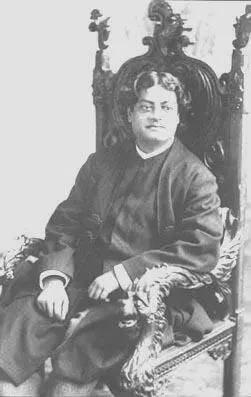Swami Vivekananda - Complete Works of Swami Vivekananda
Здесь есть возможность читать онлайн «Swami Vivekananda - Complete Works of Swami Vivekananda» — ознакомительный отрывок электронной книги совершенно бесплатно, а после прочтения отрывка купить полную версию. В некоторых случаях можно слушать аудио, скачать через торрент в формате fb2 и присутствует краткое содержание. Жанр: unrecognised, на английском языке. Описание произведения, (предисловие) а так же отзывы посетителей доступны на портале библиотеки ЛибКат.
- Название:Complete Works of Swami Vivekananda
- Автор:
- Жанр:
- Год:неизвестен
- ISBN:нет данных
- Рейтинг книги:4 / 5. Голосов: 1
-
Избранное:Добавить в избранное
- Отзывы:
-
Ваша оценка:
Complete Works of Swami Vivekananda: краткое содержание, описание и аннотация
Предлагаем к чтению аннотацию, описание, краткое содержание или предисловие (зависит от того, что написал сам автор книги «Complete Works of Swami Vivekananda»). Если вы не нашли необходимую информацию о книге — напишите в комментариях, мы постараемся отыскать её.
CONTENTS
Introduction
Volume I
Addresses at The Parliament of Religions
Karma-Yoga
Raja-Yoga
Lectures and Discourses
Volume II
Work And Its Secret
The Powers of the Mind
Hints On Practical Spirituality
Bhakti Or Devotion
Jnana-Yoga
Practical Vedanta and other lectures
Reports in American Newspapers
Volume III
Lectures and Discourses
Bhakti-Yoga
Para-Bhakti or Supreme Devotion
Lectures from Colombo to Almora
Reports in American Newspapers
Buddhistic India
Volume IV
Addresses on Bhakti-Yoga
Lectures and Discourses
Writings: Prose
Writings: Poems
Translation: Prose
Translation: Poems
Volume V
Epistles – First Series
Interviews
Notes from Lectures and Discourses
Questions and Answers
Conversations and Dialogues
Sayings And Utterances
Writings: Prose and Poems
Volume VI
Lectures and Discourses
Notes of Class Talks and Lectures
Writings: Prose and Poems (Original and Translated)
Epistles – Second Series
Conversations and Dialogues
Volume VII
Conversations and Dialogues
Inspired talks
Translation of writings
Notes of Class Talks and Lectures
Epistles – Third Series
Volume VIII
Lectures and Discourses
Writings: Prose
Writings: Poems
Notes of Class Talks and Lectures
Sayings And Utterances
Epistles – Fourth Series
Volume IX
Letters – Fifth Series
Lectures and Discourses
Notes of Lectures and Classes
Writings: Prose and Poems
Conversations and Interviews
Excerpts from Sister Nivedita's Book
Sayings and Utterances
Newspaper Reports













